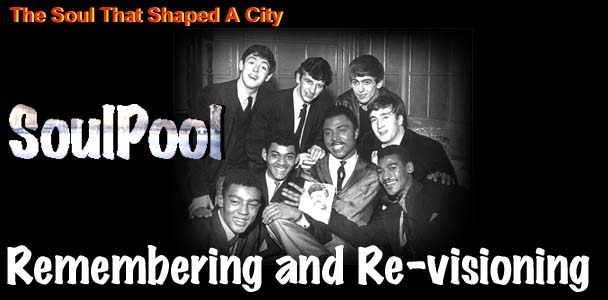
Featured in the banner above are: (front from left) Joe Ankrah, Sugar Dean, Little Richard, Derry Wilkie. On the back row are four unknown local musicians. (copyright Bill Harry. Printed with permission)
"REMEMBERING AND RE-VISIONING" Part 2
LOCAL SOUL BROTHERS AND SISTERS
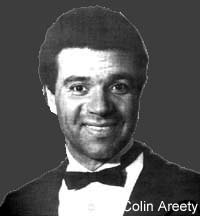 Whilst
working on this particular project, it is obvious that black artists locally
are still very much remembered especially on the "soul scene" nation-wide.
People have contacted me from as far as Lee-on-Solent, London, Bridgewater,
in order to ask about the Chants and the Valentinos. They are not forgotten.
A taxi driver was telling me how he and his mates specifically were only
interested in going to the Cavern or other clubs if the Chants, Steve
Aldo or Derry Wilkie were playing, and he was desperate to know what had
happened to them. The appeal of course was the sheer vibrancy and emotionalism
of the performances. The same performance I remember a couple of years
on when the "Shuffler-Sound" would break into their version of the Otis
Redding/Chamber Bros., "I Can't Turn You Loose".
Whilst
working on this particular project, it is obvious that black artists locally
are still very much remembered especially on the "soul scene" nation-wide.
People have contacted me from as far as Lee-on-Solent, London, Bridgewater,
in order to ask about the Chants and the Valentinos. They are not forgotten.
A taxi driver was telling me how he and his mates specifically were only
interested in going to the Cavern or other clubs if the Chants, Steve
Aldo or Derry Wilkie were playing, and he was desperate to know what had
happened to them. The appeal of course was the sheer vibrancy and emotionalism
of the performances. The same performance I remember a couple of years
on when the "Shuffler-Sound" would break into their version of the Otis
Redding/Chamber Bros., "I Can't Turn You Loose".
 As
stated in the introduction, Liverpool had their own local heroes as the
soul invasion from America exploded. For instance a lot of the local bands
co-opted names from classic soul recordings of the time. Whether it be,
The In-Crowd, taken from Dobie Gray's hit of 65, the Harlems and the Shuffler
Sound, an amalgam of Bob and Earl's elatory "Harlem Shuffle ", plus the
Valentinos, (Womack brothers group of the early sixties) A relative of
mine has told me about Steve Aldo and his rendition of "Can I Get a Witness"
that used to bring the house down at the Sink club in Hardman Street.
Also the appearances of Ben E. King at the Downbeat, or the night Inez
and Charlie Foxx brought their "Mockingbird" to the Sink club. A story
of the first appearance of "Little" Steve Wonder in the UK, around 1966,
and Colin Areety and Sugar Dean diving onto the stage to jam with him.
As
stated in the introduction, Liverpool had their own local heroes as the
soul invasion from America exploded. For instance a lot of the local bands
co-opted names from classic soul recordings of the time. Whether it be,
The In-Crowd, taken from Dobie Gray's hit of 65, the Harlems and the Shuffler
Sound, an amalgam of Bob and Earl's elatory "Harlem Shuffle ", plus the
Valentinos, (Womack brothers group of the early sixties) A relative of
mine has told me about Steve Aldo and his rendition of "Can I Get a Witness"
that used to bring the house down at the Sink club in Hardman Street.
Also the appearances of Ben E. King at the Downbeat, or the night Inez
and Charlie Foxx brought their "Mockingbird" to the Sink club. A story
of the first appearance of "Little" Steve Wonder in the UK, around 1966,
and Colin Areety and Sugar Dean diving onto the stage to jam with him.
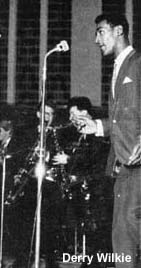 It
is impossible to talk about Black music on Merseyside without mentioning
Derry Wilkie. Hopefully there will be an interview with him in the near
future. Unfortunately, his time spent in music is reflected not as a stand-alone
artist but as an observer in the various narratives around the Beatles.
Derry Wilkie and the Seniors went to Hamburg in 1960. They were the first
Liverpool band to appear there and paved the way to what was to come later.
The sound the band made tended to be rather unique around that time because
of their brass section. Of all the musicians at that time, Derry Wilkie
has always placed Ray Charles as the seminal influence on the Mersey Sound.
It
is impossible to talk about Black music on Merseyside without mentioning
Derry Wilkie. Hopefully there will be an interview with him in the near
future. Unfortunately, his time spent in music is reflected not as a stand-alone
artist but as an observer in the various narratives around the Beatles.
Derry Wilkie and the Seniors went to Hamburg in 1960. They were the first
Liverpool band to appear there and paved the way to what was to come later.
The sound the band made tended to be rather unique around that time because
of their brass section. Of all the musicians at that time, Derry Wilkie
has always placed Ray Charles as the seminal influence on the Mersey Sound.
Ray Charles toured Germany in 1960, and both Derry Wilkie and the Beatles were intermission acts when he appeared in Hamburg. It was from this appearance that the Beatles heard the Cookies/Raelettes performing "Chains" that would later appear on their first album. Derry Wilkie later fronted the Pressmen back in Liverpool and came up against the same problems that the Chants etc., faced. The lasting legacy of Derry Wilkie is that he authenticated in a local context, Black Rhythm and Blues.
 Joe
Ankrah and his brother Eddie formed the Chants, previously the Shades,
with Nat Smeda, Alan Harding and Eddie Amoo. Their history has always
centred on the involvement of Brain Epstein and the fact that the Beatles
backed them at the Cavern. But they deserve better than just being tagged
as some kind of peripheral musicians. They were good. In fact very good.
Yes they were around in the Mersey Beat era but were not part of it. As
the early photo of the Earls at the Rialto shows, these boys were genuine
Rhythm and Blues artists. Their stance and the pose they strike is one
of the Black aesthetic of the time. You can imagine them either breaking
into Gene Chandler's "Duke of Earl" and/or the Temptations "Ain't Too
Proud to Beg".
Joe
Ankrah and his brother Eddie formed the Chants, previously the Shades,
with Nat Smeda, Alan Harding and Eddie Amoo. Their history has always
centred on the involvement of Brain Epstein and the fact that the Beatles
backed them at the Cavern. But they deserve better than just being tagged
as some kind of peripheral musicians. They were good. In fact very good.
Yes they were around in the Mersey Beat era but were not part of it. As
the early photo of the Earls at the Rialto shows, these boys were genuine
Rhythm and Blues artists. Their stance and the pose they strike is one
of the Black aesthetic of the time. You can imagine them either breaking
into Gene Chandler's "Duke of Earl" and/or the Temptations "Ain't Too
Proud to Beg".
 The
Valentinos c1965.
Left to right, Lawrence Areety, Tony Fayal, Eddie Williams and Sugar Dean.
The
Valentinos c1965.
Left to right, Lawrence Areety, Tony Fayal, Eddie Williams and Sugar Dean.
The argument that
the UK was not ready for them etc does not stand up to scrutiny. The real
reasons why Derry Wilkie, the Chants, the Valentinos, Steve Aldo et al
did not gain far greater reward that their talents merited was simply
because their style and aesthetic ran contrary to the music business and
the musical forms of the day. We had local talent who themselves were
fusing gospel, acapella, and producing driving R'n'B when the overall
musical culture of the UK was narrow and insular. This was one of the
results of the musicians' union ban and what was discussed earlier. Add
to this the heavily controlled airwaves and the minute allowance made
for music that was outside the normal boundaries of that which was deemed
to be popular tastes of the day. So even on Merseyside, local clubs were
mainly Folk/Trad Jazz based. The Dixieland tradition stretching back to
the 1920s was based on a white interpretation of the music. But as Ella
used to sing, "It don't mean a thing if it ain't got that swing."
Musical tastes of black kids from Liverpool, which stretched back to the
Harlem Renaissance and beyond, would therefore have been in direct contradiction
to the Folk/Trad Jazz tradition.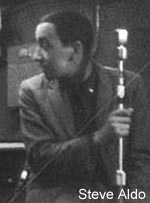
(right) Steve Aldo (copyright Bill Harry. Printed with permission)
The situation concerning the Chants, if it wasn't so serious would be laughable. Their musical arranger on Pye Records, who they signed for after leaving Brian Epstein, was later to be a co-writer of the theme tune to "Neighbours." In the UK, there were no Motown, Stax, Atco equivalents, so Black artists were given material to record that was contrary to their own musical aesthetic, yet blue-eyed White boys were given R'n'B records to cover. These details tend to get lost and do not fit easily into the streamlined story of Mersey Beat. Closer inspection of what happened to the Chants, the Valentinos and others discloses problems around the musical industry and individuals linked with it at every level. The Musical industry would hardly have gone out of its way to market these bands, when the Black community in Liverpool had suffered continual exclusion from spheres of cultural life over a long period of time. Waste of talent? Anyone who saw the documentary "Who Put the Beat in MerseyBeat", would have seen at the end a classic Black acappella version of "Chains". Can we have a release please?
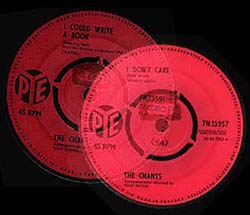 A
lot of these black musicians are still around today. A lot have moved
on. Some still sing and play, and do it quite beautifully. This narrative
has tried to reflect their "voices" and the "voices" before them. Hopefully,
we have now produced a framework that people can feel comfortable with,
in order for their personal reminiscences to be voiced in a non-exploitative
setting. It is appalling when you think that the Chants and the Valentinos,
hold a special place in the memories of more people from outside of the
city than within.
A
lot of these black musicians are still around today. A lot have moved
on. Some still sing and play, and do it quite beautifully. This narrative
has tried to reflect their "voices" and the "voices" before them. Hopefully,
we have now produced a framework that people can feel comfortable with,
in order for their personal reminiscences to be voiced in a non-exploitative
setting. It is appalling when you think that the Chants and the Valentinos,
hold a special place in the memories of more people from outside of the
city than within.
 Meanwhile
whenever the city of Liverpool gratifies itself in an orgy of Beatle/Mersey
mania, we will remember the Liverpool "voices", rooted in musical idioms
of Afro-American, the Caribbean, and the African West Coast. Duke Ellington
always used to describe anything he had admiration for as being "BEYOND
CATEGORY". A fitting epithet for the Black musical culture of Liverpool.
Meanwhile
whenever the city of Liverpool gratifies itself in an orgy of Beatle/Mersey
mania, we will remember the Liverpool "voices", rooted in musical idioms
of Afro-American, the Caribbean, and the African West Coast. Duke Ellington
always used to describe anything he had admiration for as being "BEYOND
CATEGORY". A fitting epithet for the Black musical culture of Liverpool.
POST SCRIPT
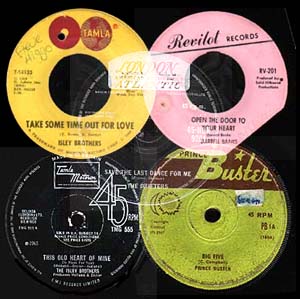 For
people accessing the web-site from outside of the UK. The term "Northern
Soul", derives from white working class kids, who from the early sixties
onward and to this present day listen, dance and champion soul music,
both the famous and the obscure. It originally started off being called
"Imported-Soul" but as the white middle class started to exert an unhealthy
influence on popular culture in the early seventies through the appalling
"Progressive Rock" (surely regressive), cities and towns in the North
of England "kept the faith ", though there was and is a major following
in the south of England. There is a total reverence and respect for the
music. No cover versions, no rip-offs, just respect. Amen to them. Unfortunately
the City of Liverpool is not one of those cities that has "kept the faith".
Another example of marginalise rather than recognise. Instead, we are
expected to believe that somehow Liverpool is the Nashville of the North
and that is part of our tradition. When you analyse and scrutinise the
reasons behind this myth, then you are confronted not just with the endemic
racism of Liverpool's institutions, but the exclusion and suppression
of the major cultural expression of the city.
For
people accessing the web-site from outside of the UK. The term "Northern
Soul", derives from white working class kids, who from the early sixties
onward and to this present day listen, dance and champion soul music,
both the famous and the obscure. It originally started off being called
"Imported-Soul" but as the white middle class started to exert an unhealthy
influence on popular culture in the early seventies through the appalling
"Progressive Rock" (surely regressive), cities and towns in the North
of England "kept the faith ", though there was and is a major following
in the south of England. There is a total reverence and respect for the
music. No cover versions, no rip-offs, just respect. Amen to them. Unfortunately
the City of Liverpool is not one of those cities that has "kept the faith".
Another example of marginalise rather than recognise. Instead, we are
expected to believe that somehow Liverpool is the Nashville of the North
and that is part of our tradition. When you analyse and scrutinise the
reasons behind this myth, then you are confronted not just with the endemic
racism of Liverpool's institutions, but the exclusion and suppression
of the major cultural expression of the city.
Antonio Machado once
wrote, "When the sound is heard, people dance". This is important to remember
when discussing the period of the late fifties and early sixties. The
comparisons take you back to say, skiffle and Lonnie Donegan counter-posed
against Ray Charles and his "Lonely Avenue" or "It's Alright", that never
gained release in this country. Through to the sixties, Marvin Gaye's/Steve
Aldo's "Can I Get a Witness" versus the Searchers "Needles and Pins".
Then to the Beatles, "Paperback Writer", "Penny Lane", against Wilson
"Wicked" Pickett, "Land of 1000 Dances" or "Retha" and "Baby I Love You".
Songs that reek and drip with sensuality, backed up by a honking, stonking
horn section. It is not hard to see how soul music started to gain a major
foothold in the British charts. Not for nothing did John Lennon wish to
know about the Funk Brothers (The Motown House Band) and how they produced
their back-beat, or Ringo Starr seek out the "Wicked" Pickett and
ask "What is Soul". In Liverpool, we heard the sound  and
we danced. The sound we danced to was Black - same as it ever was. So
what place do these talented musicians have in local popular culture?
Singing in bars? A lifetime schlepping around, waiting for gigs? Our local
soul heroes and the R'n'B legacy they represent deserve so much more.
and
we danced. The sound we danced to was Black - same as it ever was. So
what place do these talented musicians have in local popular culture?
Singing in bars? A lifetime schlepping around, waiting for gigs? Our local
soul heroes and the R'n'B legacy they represent deserve so much more.
Find
out what's
happening today at: SOUL IN
THE CITY
 |
 |
 |

